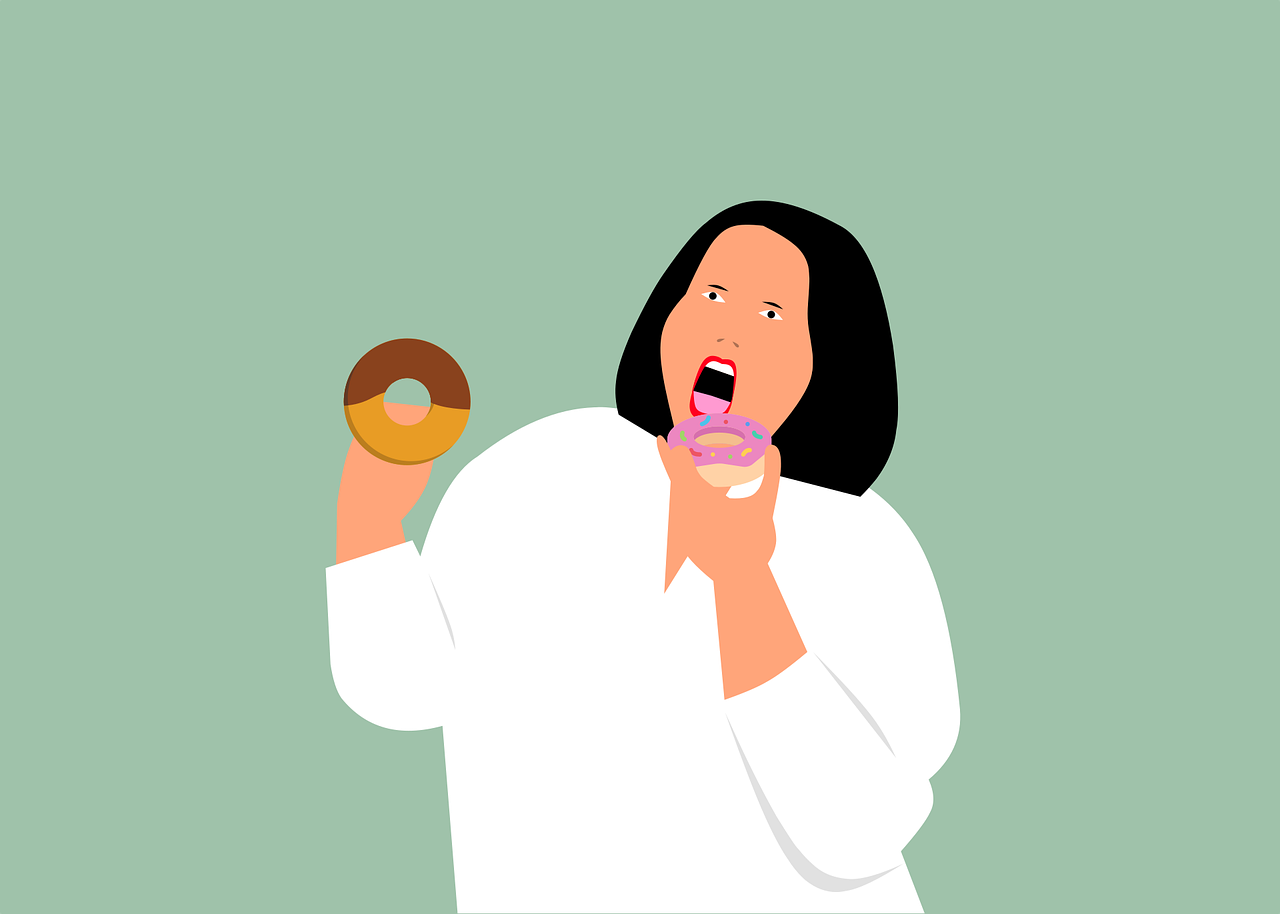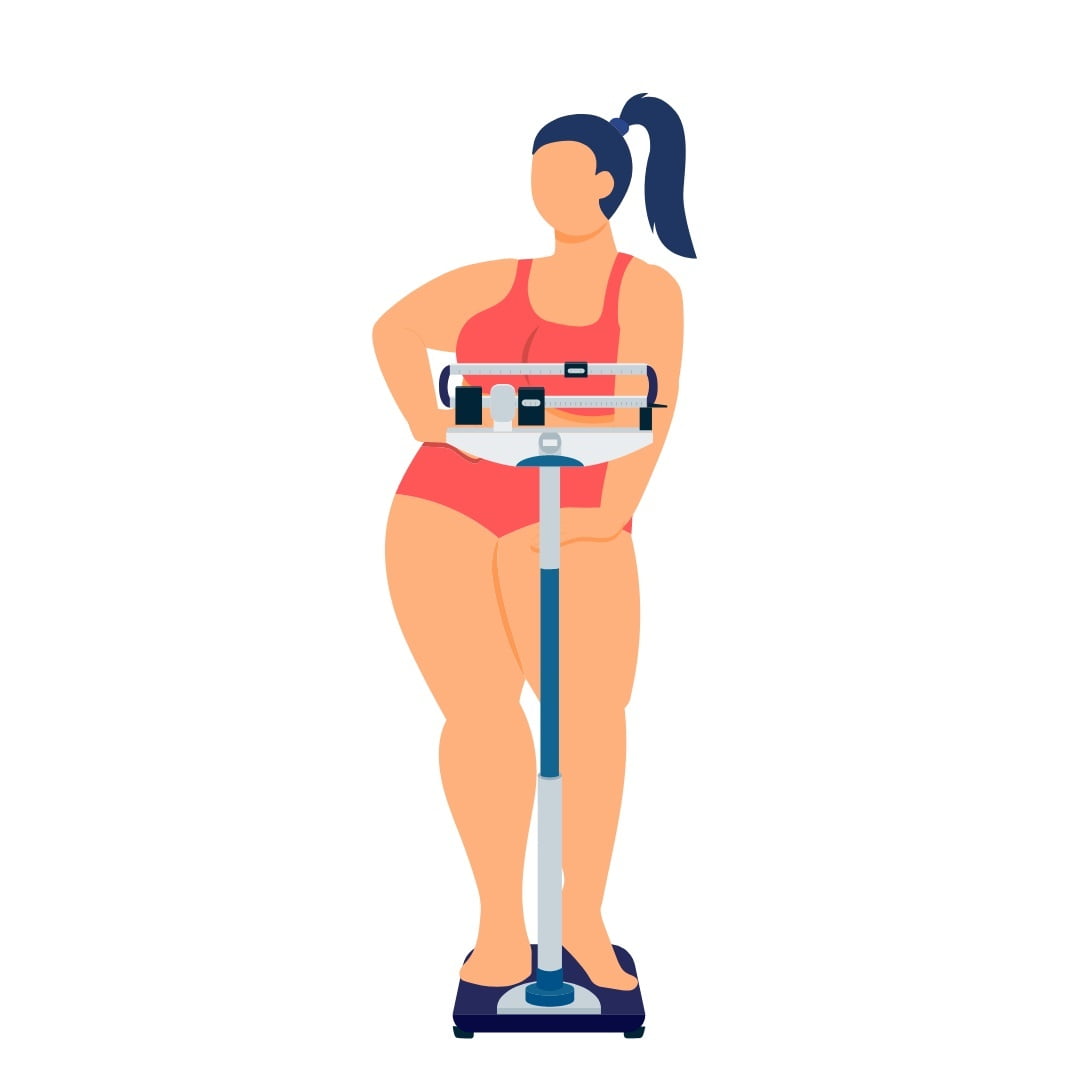Intuitive eating principles versus weight-loss
You want to lose weight. But you also don’t want to be obsessed with tracking every morsel of food you eat over the next several weeks or months to reach your fat loss goal.
Is it possible to ditch the food scale and lose weight based solely on listening to your body?
In other words, can you apply various principles of intuitive eating (e.g. eating when you are hungry and stopping when you are full) and reach your weight-loss goals?

First, it’s important to unpack what intuitive eating actually means. In its most general form, intuitive eating means paying attention to your body’s internal cues to guide your eating choices.
However, intuitive eating is also considered to be a non-diet approach to eating that goes beyond simply eating when you are hungry and stopping when you are full. In fact, there are 10 different principles of intuitive eating that were created by Registered Dietiains Evylyn Tribole and Elyse Resch.
The 10 Principles of Intuitive Eating: Do they apply to weight-loss?
Reject the Diet Mentality
Honor Your Hunger
Make Peace with Food
Challenge the Food Police
Respect Your Fullness
Discover the Satisfaction Factor
Honor Your Feelings without Using Food
Respect Your Body - while also acknowledging it’s okay to want to look and feel differently.
Exercise—Feel the Difference
Honor Your Health with Gentle Nutrition
While I believe some of these principles could be adopted by someone trying to lose weight, others are out of step with the desire to lose weight. So let's discuss some of them and if they can be applied to weight-loss.
Reject Diet Mentality (#1)
The first principle of intuitive eating is ‘reject the diet mentality.’ While I don’t personally believe the word ‘diet’ should have negative connotations, the authors of intuitive eating would disagree when they say “Get angry at diet culture that promotes weight loss and the lies that have led you to feel as if you were a failure every time a new diet stopped working and you gained back all of the weight.”
To the authors, diet is synonymous with restriction, rules, deprivation, and an attempt to become smaller no matter the cost.
That said, it’s clear from the very first principle that the mere desire to lose weight or ‘diet’ is in direct opposition with the intuitive eating philosophy. As a weight-loss dietitian, I disagree that all diets are problematic because not all diets are created equal.
There is a very big difference between someone trying to lose weight by ingesting detox teas and laxatives versus losing weight by reducing their intake of added sugar or alcohol and incorporating more fruits and vegetables.

Nonetheless, the authors make it abundantly clear that weight-loss is to not be pursued if you plan to fully embrace an intuitive eating approach. To debate whether pursuing weight-loss is right or wrong is a blog post for another day but I think arguments can be made both for and against it, but it largely comes down to one’s reason for wanting to lose weight and the method for how they go about it.
On one hand, following an extremely restrictive diet could put someone on the path to disordered eating patterns. Yet for an obese individual with diabetes or osteoarthritis weight-loss could be extremely beneficial for their overall health.
And even if you may not suffer from chronic health conditions, and your only reason for wanting to lose weight is to feel more confident in your favorite jeans - that’s your choice, and I would not fault you for it. Everyone deserves to feel good in their body.
Honor Your Hunger (#2) & Respect Your Fullness (#5)
But that’s only one principle of intuitive eating, let’s discuss a few more. The principles ‘honor your hunger’ and ‘respect your fullness’ are principles two and five. Both principles refer to paying attention to your innate hunger and fullness signals. These principles may also feel at odds with weight-loss. Perhaps you have been always under the impression that to lose weight it requires you to starve yourself. Well, this couldn’t be further than the truth.
How hungry you feel during weight-loss is partially due to the extent of your calorie deficit but also due to the types of foods you choose. If you are eating a diet of rice cakes and green juice, of course you are going to feel perpetually unsatisfied. But if you are fueling your body with a balance of whole foods and including macronutrients (carbs, protein, and fats) in the right balance you are much more likely to feel content while losing weight.
While experiencing some hunger is to be expected while losing weight, it doesn’t mean you should feel ravenous 24/7. As a weight-loss dietitian, I spend much of my time educating my clients about the types of foods that will keep them feeling full and satisfied while in a calorie deficit.
I’ve had several clients lose weight and have minimal hunger issues by simply focusing on incorporating more satiating foods like lean protein, non-starchy vegetables, and drinking more water. Similarly, I’ve had clients who have lost weight by not necessarily changing the composition of their diet but simply becoming a more mindful eater and learning to tune into their hunger and fullness cues.
This brings me to the point that your ability to potentially lose weight while still honoring your hunger and respecting your fullness depends on where you are starting weight. If you have struggled with binge-eating most of your life, and you finally learn to begin to eat intuitively versus let your emotions drive your eating -you may lose weight as soon as get control of your binge-eating.

That said, it is quite possible to lose weight by solely listening to your hunger and fullness signals. However, I do find people are more successful when given some nutrition parameters to guide their choices (e.g. having a calorie range to hit, focusing on eating more fiber or protein rich foods, or attempting to take a certain number of steps each day) versus solely relying on intuitive eating.
Because the reality is weight-loss isn’t an intuitive practice and being able to project whether you are actually in a calorie deficit often requires more than paying attention to your internal cues but having a plan for how to achieve a calorie deficit. Your plan could be focusing on portion control, being aware of the caloric density of the foods you are eating, or tracking your food which combines both of these tactics and is arguably the best way to predict whether you are in a calorie deficit while meeting your other nutrient needs.
Challenge the Food Police #4
The fourth principle of being an intuitive eater is to ‘challenge the food police.’ To quote the authors this means ‘Scream a loud no to thoughts in your head that declare you’re “good” for eating minimal calories or “bad” because you ate a piece of chocolate cake.”
I’m 100% aligned with this principle whether you are a self-proclaimed intuitive eater or are actively pursuing weight-loss. You don’t need to assign labels of good or bad to food and then feel morally superior or guilty for your food choices. This is exactly why I teach an all foods fit approach to weight-loss using a flexible dieting approach. Food doesn't need to be labeled as good or bad but obviously there are certain foods that are going to support your weight-loss efforts better than others - so your diet can’t be a ‘free for all’ either.

Losing weight requires you to figure out how often you can have a certain food and in what quantity while still making progress toward your goals. You can eat chocolate cake, drink wine, or consume any other food you may at one time or the other viewed as being ‘bad’ but it also requires balancing those foods with nutrient dense foods like fruits, vegetables, lean proteins, and healthy fats to support not only your weight-loss efforts but your overall health and vitality.
The Verdict: Is it possible to lose weight eating intuitively?
While I would not recommend you utilize intuitive eating alone in the pursuit of weight-loss, I think that many of the intuitive eating principles can be incorporated at various phases of your health journey. In fact, if you have gotten to your goal weight or maybe just need a break from tracking your macros- transitioning to an intuitive style might be the next best step.
After all, tracking your food is not meant to be a lifelong practice. In my program, Eat Fit for Fat Loss - I teach you how to use tracking as one tool to help you reach your weight-loss goals by building awareness around your eating habits and developing a strong foundation of nutrition knowledge.
But once you begin to understand nutrition and become aware of your own ‘nutrition blind spots’ moving to intuitive eating becomes much more natural. And I personally love the idea of being able to both utilize principles of good nutrition and my own body's wisdom to inform my food choices for the long run.